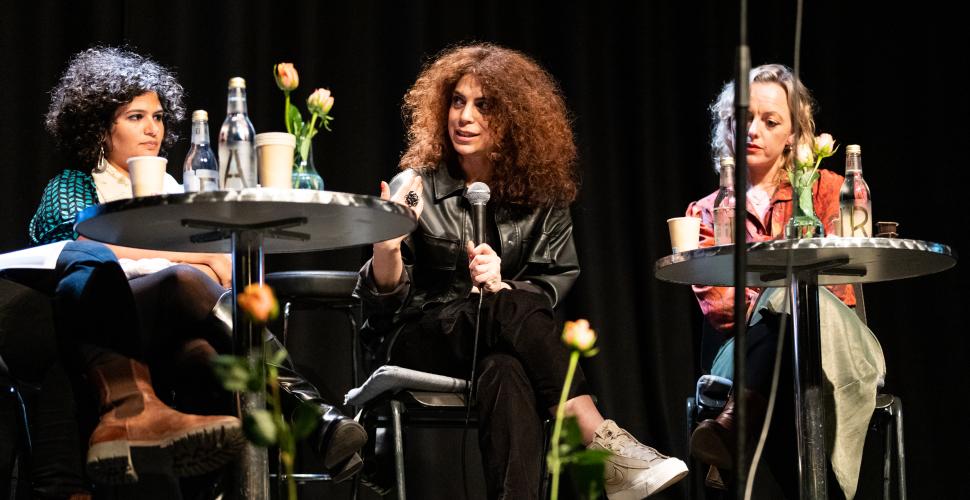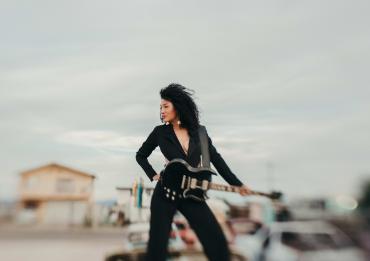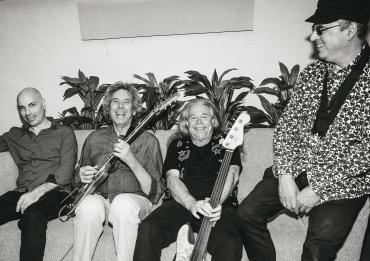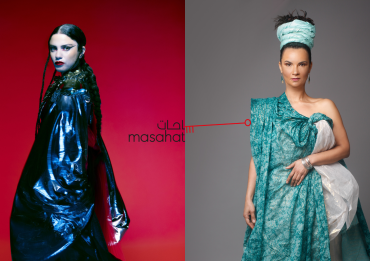Menu
Close
Art as resistance and activism | Panelists in “Arts, culture and feminism in MENA” share their stories

Bilder av
Julie Brundtland Løvseth
Innleggsdato
05/04/2023
Art as resistance and activism | Panelists in “Arts, culture and feminism in MENA” share their stories
The mood was set on the cultural arena that Cosmopolite is, pink roses decorated the stage as a symbol of beauty and feminine power complementing the panelists. An attentive audience gathered to take part in what was truly a conversation, more so than a discussion.
Beauty giving courage to fight
Moderator of the panel, and director of Masahat organization, Zeina Bali introduced the first question by saying that the Algerian singer Souad Massi covered her eyelids with daisies on the cover of her latest album Sequana.
- She is not covering her face from seeing the ugliness in this world, but rather using the flower to give her a lot of courage and hope to continue fighting, Zeina said.
The moderator went on to encourage panelists to share how arts and music have been a lifeline for them.
Nasim Mashak, an Iranian DJ and artist started out powerfully:
- Art can cut through stone!
Mashak goes on to talk about how art becomes increasingly important in Iran, as the restrictions grow in volume, artists think a lot about how to bend and move around restrictions.
- When you cannot dress a certain way or say what you want, that gives me even more power to do it!
The first woman to play drums in public in Egypt
Mariam Kirollos is a musician and a senior advisor originally from Egypt who has lived in Norway for several years. She claims music to be one of the most powerful tools for social change:
- To understand music, you don’t have to be a literate. In Egypt, during British colonial times, the chants were always rhyming. It was extremely effective and scary; this is why songs were banned!
Mariam was influential in and on the ground during the 2011 revolution in Egypt. Women had a central role during this revolution, and there is a famous photograph of Mariam playing a drum in the streets.
- Art as resistance in the revolution was led by women.
She continues:
- I was the first Egyptian women to carry a drum on the street! I did it mainly because drums are for men. I got called names and people were asking “Where is the monkey?”. One time I was drumming for six hours. The most macho protestor there in the end said: “Well done”. I thought to myself: “Maybe this did something?” More women played drums and took up space.
Mariam sums up this story in a quote:
- Resistance comes in small forms
Being an artist defines your character in Morocco
Enja Sæthren is a political scientist and artist who lived in Morocco for some years where she was part of the artist community in Rabat and performed a “one woman show” in the theatre.
- In Morocco there are certain subjects you should not touch: Do not criticize the King, do not criticize religion and don’t question Morocco’s ownership of Western Sahara. There is no national media outlet not controlled by the King. In this situation, art becomes very important, Sæthren explains, as she becomes more personal:
- I could not see a distinction between being an activist and being an artist. It is a level of intensity I have not found being an artist in Norway. Also, there is greater personal sacrifice, making it defining for your character.
Zeina followed up on the topic, explaining she was told by an art gallerist in Norway that if she were to organize an exhibition in their venue, it should not be political in subject. “So, what have you been doing this whole time here?” Zeina reflected and went on to explain to the audience how art and politics in the middle east is far more intertwined than in the west.
Enja just came home from an impactful journey to Ukraine and shared her insights with the audience. During her visit she met a group of women who were planning art projects in film and theatre, visioning what Ukraine could look like.
- There was an abundance of strength and resilience. I truly saw the human capacity we have when we are pushed to extremes.
Watch the entire show on YouTube.





